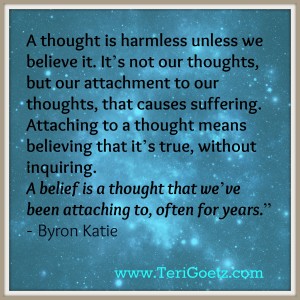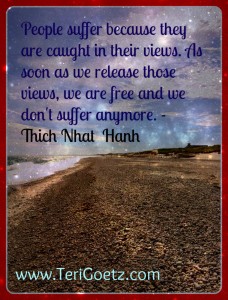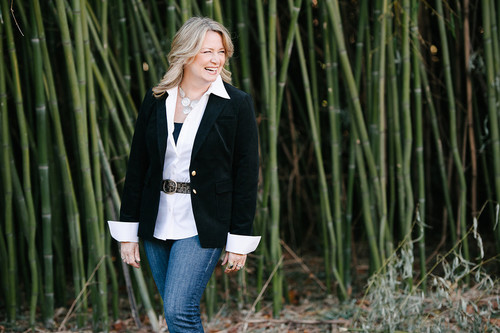You do so much for your kid. He doesn’t acknowledge it— you feel taken advantage of and then hurt. Your situation confirms that you are unworthy of respect.
You believe that every time your boss speaks to you, it is with disrespect—you feel angry and less than.
Your partner misses the hamper all the time and you have to pick up his underwear. Annoyed and helpless to make a change, you feel hurt that he doesn’t respect your wishes and you take it personally.
These are some of the common minor annoyances we run into every day. Some people don’t react to them. For others, they cause stress and trigger emotional responses. If you are one of those people, you take each irksome situation personally, and it dredges up old wounds. (By the way, if it wasn’t a wound, you wouldn’t care all that much.)
These old wounds are very strongly embedded in our unconscious mind – and we’re ready to pounce on any experience that supports our limiting beliefs about ourselves. We become used to feeling angry, abandoned, stressed, hurt, unworthy, fearful. These emotions feel out of our control, like they just happened to us.
These types of emotions were created because of our survival instincts, and they tend to be the most entrenched and strongest. They are usually rooted in fear of potential annihilation. As a child, experiences lay down the tracks that your emotions have been following ever since. If you were (or felt) abandoned, criticized, abused then, new experiences that trigger those feelings now send you back to all the knee jerk reactionary emotions you’ve developed in self-defense over the years.
When we feel one of these emotions it means that unconsciously we are returning back into the past and dredging up that wound again. Then, this new experience confirms our feelings about ourselves. The cycle happens so often that the emotion becomes a habitual response.
The truth is, unless we are constantly vigilant, we become addicted to our emotions – they are on autopilot and we react without thinking consciously. These survival emotions – the ones you felt and created in the past (mostly childhood) are what you’ve always known. AND -– ready? — you get immediate gratification from them because they are familiar. Even if they suck.
So what exactly makes this bad emotion feel gratifying? Maybe you feel justified: “See? I was right. Everyone does take advantage of me.” You feel hurt, angry, and fearful that if you do something different – like set boundaries – people won’t like or love you any longer. So instead, you get this weird gratification from feeling the familiar emotion.
And, you stay stuck.
Because we are creatures of habit, this feels normal to us. We don’t realize that emotions come from thought and thoughts feed emotions, which then becomes a vicious cycle. Sometimes we have an emotional reaction that is so ingrained, it seems to come out of nowhere. We get used to feeling a certain way, and that feeling, in turn, triggers a thought, which feeds the emotion more and so on. It’s like the snake eating its own tail in an endless negative feedback loop.
The problem with changing is that change feels elusive and, honestly, we don’t want to do the work.
Why is it so hard?
You’re used to using your senses to give you feedback. When you want to change anything in your outer world, you see evidence of it changing and making progress – like renovating a bathroom or changing your employee’s job description. Your senses pick up on what is progressing – there are signs. Either you see the bathroom getting done or not. Either your employee is doing her job, or she’s not. It’s pretty clear.
When you try to change the way you feel about something, it becomes this amorphous confusing blob of thoughts, self-recrimination for not changing, and effort. It’s internal, “unsee-able” and you can’t necessarily use your reliable (you think) senses to confirm what is happening. Plus, changing makes everyone clearly uncomfortable. It’s the unfamiliar, and the unfamiliar makes us nervous.
But creation (and change) starts in the mind.
Think of any invention that seemingly came out of nothing: the cell phone, the atom smasher, the space shuttle. All of these advancements came from someone thinking different thoughts, putting them together, and getting excited about them, until it became an outward reality.
- If you want to change your outward reality– have different thoughts, which will create different emotions, to then create a different outcome.
- If you don’t want to feel this way anymore–change the way you think. .
The beautiful thing about being human is that we have choice and free will. We can, believe it or not, choose to feel differently in any situation. Nothing is making you feel a certain way. You are telling yourself to feel that way.
So, for starters, answer these simple questions:
- What habit do you want to replace your old customary way of responding?
- What do you want to believe – your limitations or your personal power?



